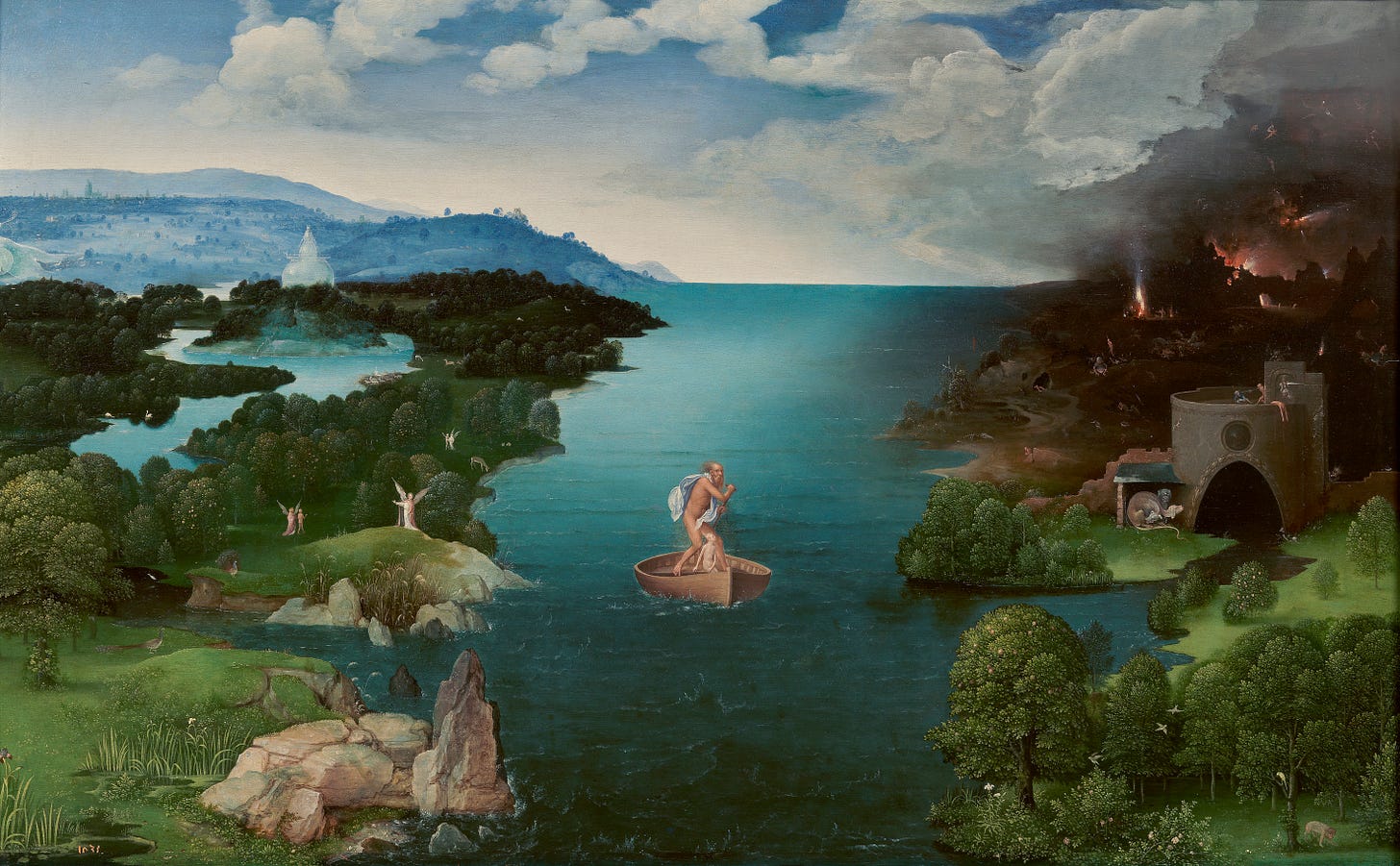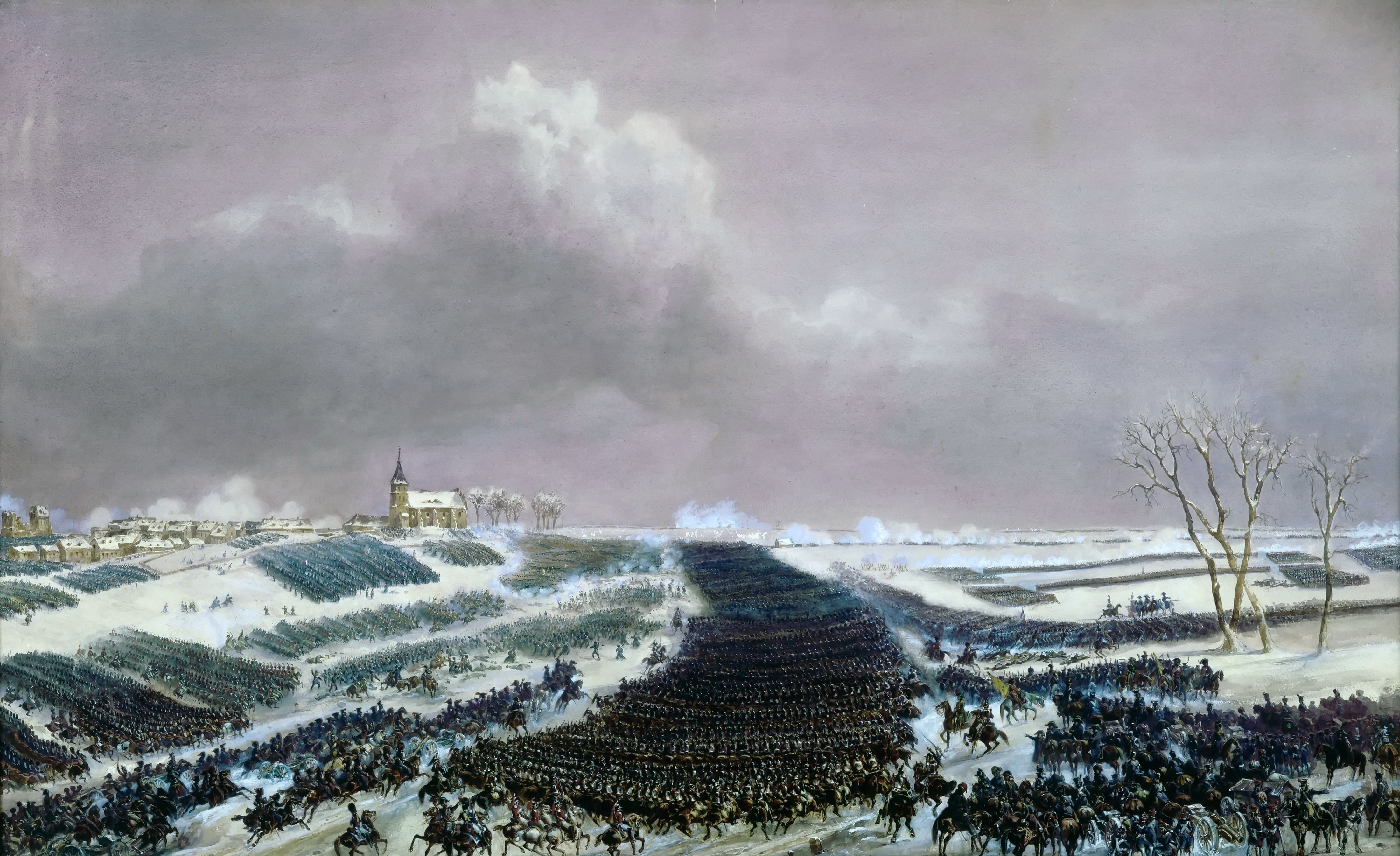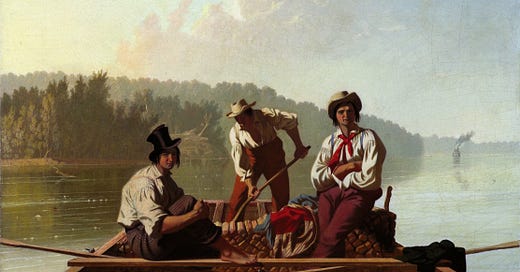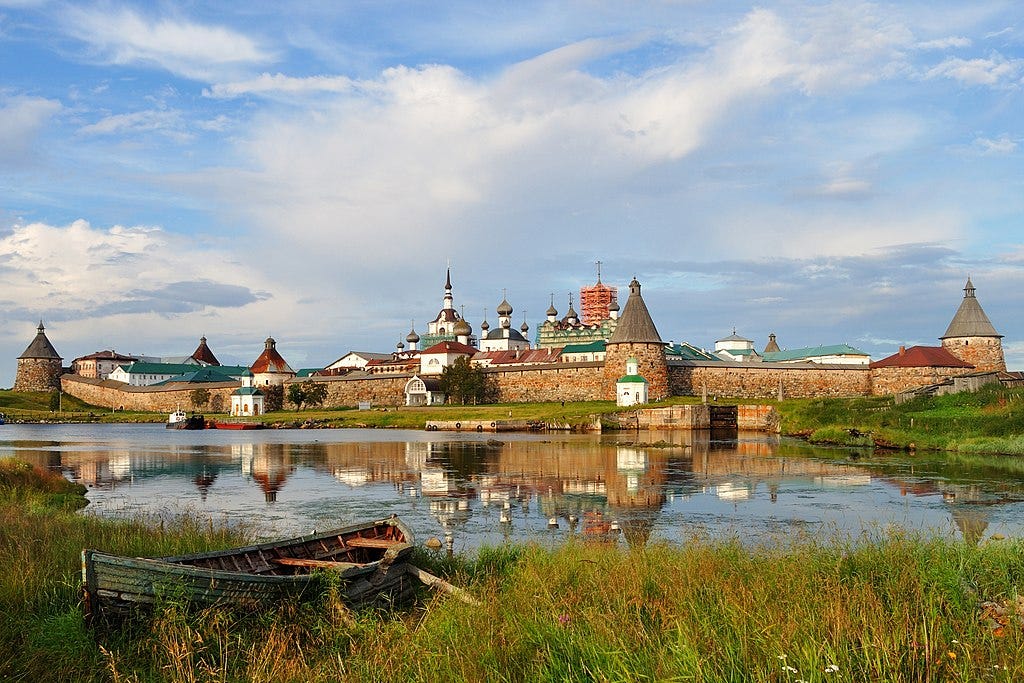Welcome to week fourteen of War and Peace 2024. This week, we read Book 2 Part 2 Chapters 10 – 16. Everything you need for this read-along and book group can be found on the main War and Peace page of Footnotes and Tangents. There you will find:
The reading schedule with links to daily chat threads for each chapter.
Weekly updates like this one.
These resources are free for all, thanks to the generosity of paying subscribers who support my writing and this slow book group. Paid supporters have access to All Tolstoy’s parties: every ball and banquet, reviewed, rated and ranked. You can also start your own discussion threads in the chat area. Thank you so much for your support!
This is a long post, and your email provider may clip it. It is best viewed online here.

The week’s tangent: Two men in a boat
I wrote this piece during our first slow read of War and Peace in 2023.
Listen to this tangent:
How long has it been, old friend?
How long is a rope? Flung from boat to bank, beneath a mirror sky?
Do you remember our first ship? The one I made for you. Your idea, but my design. The hull scooped out and the deck smoothed down – in my father's workshop, whilst the old man was away.
You wanted to build an ark. Back then, all your games had biblical proportions. In the wood behind the house we gathered feathers and flowers, seeds and leaves. Two of each, before the flood.
You'll never know what it meant to me, your summer visits. Time stolen away from grammar and geometry. I hitched myself to your dreams, untethered and unwieldy, we flew into the sun.
Today, the rope's wound in. We pay the ferryman. The bank drifts away. Two men in a boat.
How long has it been?
You look well. You've been in the country. Making good. Living for others. There's a fire in you. You're talking rubbish and it makes me smile. I've missed those childish ways, hands to heaven, expecting the impossible.
I've grown thin. In full light you can see right through me. At night, the wounds reopen and it takes all my will to keep me here, on this narrow earth. But you'd not understand. So much has happened since we set our ark on the lake, before the flood.
How strange life is. Years can pass and our friendship is the same as it ever was. But tomorrow in a moment, something may change everything. Look up, you say. And up I look. A cloud hangs heavy in the sky.
There'll come a day, old friend. You or I will go below and cross a river alone. Pay the ferryman and say farewell.
It's not the going that frightens me. Nor what lies on the other side. What worries me is the waiting, and the living in the dark. Not knowing. It's impossible this boat goes nowhere. It's impossible this flood won't end.
At the end of summer, your ark was still on the lake. Bobbing in uncertainty. Till it was wrecked in a winter's storm long after you had gone.
The river crossed, we sit in silence. The ferryman tethers the rope. The world would change you and wake you from your silly dreams. But not I.
Change me, if you can. But never change. Never change, old friend.

Chapter 10: Yes, Count
Pierre resolves to reform his estates: free the serfs, end corporal punishment and build schools and hospitals. A cunning chief steward says, “Yes, count”, and makes sure none of this happens. In Kiev, Pierre continues his old way of life in new surroundings, consoled by the knowledge that he is helping mankind. His serfs appear happy and thankful, but in reality, his stewards are duping him, and the world continues as it did before.
Tangent: Beware the easy life
Boris in high society finds himself “surprised at the rapidity of his success, and at the inability of others to understand these things.” If success is this easy, why doesn’t everyone do it?
Pierre in the country marvels at his own success at improving life on his estates:
‘How easy it is, how little effort it needs, to do so much good,’ thought Pierre, ‘and how little attention we pay to it!’
Both young men are labouring under misconceptions about the world. But there is a big difference. Unburdened by principles, Boris may well rise to the top. He will do well in life, but I suspect he may never live. Life is about failure and learning from failure. His apparent lack of struggle suggests a shallowness; as though he neither knows nor cares about how wide and deep life can be.
Pierre’s goals are far more ambitious. But for the moment he is oblivious that he has failed. And yet past experience should encourage us to be hopeful for Pierre’s sake. When he makes mistakes, in money and marriage, he is the first to call himself a fool.
He told the Brotherhood of Freemasons that his greatest passion and vice was women. I was unconvinced. My guess was sloth. Which I think is half right. He expects life to be easy so he goes with the flow. This makes him maddening to watch. But he is also a hopeless dreamer and a chaotic seeker, and unlike Boris, he seems destined to live a rich and fascinating life.
Chapter 11: Old friends, new ways
Pierre visits Andrei on his estate. Both men are much changed. After an awkward start, they begin to argue about the nature of good and evil. Pierre believes he ruined his life by living for himself and found happiness in living for others. Andrei lives for himself and his family. He also wants to free the serfs, but only because he has seen how unlimited power turns good men into monsters.

Footnote: The emancipation of the serfs
‘You may have not seen, but I have seen, how good men brought up in those traditions of unlimited power, in time they grow more irritable, become cruel and harsh, are conscious of it, but cannot restrain themselves and grow more and more miserable.’
This rich and complex chapter contains some things we may find hard to read. Andrei’s denial of the “spiritual needs” of the peasants and the defence of their “animal happiness.” How can we listen to let alone love a man who seems so incapable of recognising the humanity of others? It is first worth remembering that Tolstoy is writing historical fiction. As Hilary Mantel wrote, historical fiction need not flatter the past or the present. Done honestly, “it can challenge and discomfort.”
By the time Tolstoy sat down to write War and Peace, he was vehemently opposed to serfdom. He was also ashamed of his complicity in the institution, including the ways he had abused his “unlimited power” on his estates. Like Pierre, he made plans to free his serfs and set up schools to educate the peasants. Unlike Pierre, he was hands-on: teaching in the schools and exposing the cruelty of those who defended the old system.
On 5 March 1861, Alexander II published the Emancipation of Serfdom manifesto, liberating all privately owned serfs. The proclamation was to be read out in every church and published in every newspaper. Tolstoy was touring Europe at the time and he was angered by its tone: granting freedom as a favour rather than undoing an injustice.
Still, this was a significant moment in Russian history, decades in the making. So much of War and Peace is Tolstoy’s exploration of where his ‘modern’ Russia came from. In this chapter, he lets two intelligent landowners sit down in 1806 and talk about serfdom. He’s asking, what would they say to each other? Without flattering them, or us, Tolstoy lets the past “challenge and discomfort.”

Chapter 12: Two men in a boat
Two old friends set out to Bald Hills. Pierre can see Andrei is unhappy but is reticent to begin talking about his beliefs – fearing they will be shot down. But when he does speak, Andrei listens and does not laugh at him. They cross a river at sunset. Pierre has faith in the world, but Andrei will only be convinced by “life and death”, his grief and remorse. “If only it were so!” he says. On the other bank: outwardly he is unchanged. Inwardly, he has begun a new life.
Pierre is the character we see constantly reborn, while Andrei is the character who dies again and again.
— Thomas J. Kitson in Yiyun Li’s Tolstoy Together
Tangent: Bring the dead souls back
For some 200 pages, we thought Pierre desperately needed Andrei. In truth, Andrei needed Pierre just as much, perhaps even more. Seeing the lofty sky was one thing, but having a friend whisper “believe” in that sky is quite another. As Nikolai saw the reality of things only briefly as Natasha sang, Andrei is thrown a life ring through Pierre’s lisping voice, fading into the sound of the waves and the reflection of the sun on the water.
All this takes place on a ferry across a river. The symbolism is strong: in ancient Greek mythology, it is Charon who takes dead souls on his ferry to cross the river Acheron to the Underworld. But Andrei has been to the Underworld. He died at Austerlitz. Perhaps Pierre is the one who brings dead souls back?
‘Yes, if only it were so!’ said Prince Andrei. ‘However, it is time to get on,’ he added, and stepping off the raft he looked up at the sky to which Pierre had pointed, and for the first time since Austerlitz saw that high everlasting sky he had seen while lying on that battlefield; and something that had long been slumbering, something that was best within him, suddenly awoke, joyful and youthful, in his soul. It vanished as soon as he returned to the customary conditions of his life, but he knew that this feeling which he did not know how to develop, existed within him. His meeting with Pierre formed an epoch in Prince Andrei’s life. Though outwardly he continued to live in the same old way, inwardly he began a new life.
This is a book about how we change slowly over days, months and years. And how we constantly struggle to develop feelings felt in the shortest of moments, like sharing a sunset with an old friend on a boat bound for home.
Chapter 13: God’s folk and bad jokes
When Andrei and Pierre arrive at Bald Halls, Marya is receiving two pilgrims whom Andrei disparagingly calls “God’s folk.” In contrast to his sensitivity towards Pierre’s beliefs, Andrei treats Marya and these pilgrims harshly. And Pierre behaves no better: one man’s religion is another’s superstition. But in the end, both men are penitent, and Marya, as is her way, forgives them.

Footnote: Pilgrims
Princess Marya’s “God’s folk” are drawn from Tolstoy’s own childhood. His aunt sheltered pilgrims as their home in Yasnaya Polyana, on their way to holy places like the Solovets Monastery. Some of these pilgrims spent their entire lives on the road.
In 1881, Tolstoy disguised himself as a peasant and walked four days from his home at Yasnaya Polyana to the Optina-Pustyn Monastery. He was in search of the wisdom of a famous monk called Father Ambrosy. But when he arrived at the monastery, bedraggled, his feet covered in blisters, the monks recognised him at Count Leo Tolstoy. The world-famous and wealthy writer could not escape himself. And he didn’t appear to find much wisdom there either, returning home the next day by train.
In the previous chapter, Pierre and Andrei were pilgrims of life, clearly on unfinished journeys to destinations unknown. In this chapter, they meet two more pilgrims, but initially fail to treat them with the sincerity and courtesy that they treat each other. As readers, we inevitably care more about Andrei’s journey. But for a moment, I want to know about Ivanushka’s story. Why did she dress as a young man and take to the road? Where did she come from? And what will happen to her when she leaves the pages of War and Peace?
Chapter 14: A fine fellow
Chastened, Pierre listens attentively to the pilgrims and treats them with renewed kindness. Marya tells Pierre she is worried about Andrei. His wound has re-opened and he is suffering spiritually. During his stay, everyone takes a shine to Pierre. “A fine fellow” who “talks rubbish” says the old prince. Pierre realises the strength of his friendship with Andrei, conveyed in the happiness he brings to the household at Bald Hills.
Pierre • Andrei • Marya • Nikolai Bolkonsky
Pierre makes Princess Marya, who’s embarrassed all the time, feel comfortable. Here, he makes old Prince Bolkonsky, who’s often angry and cruel, speak with kindness—possibly the only time in the novel he does so. One has to adore Pierre for his effect on people.
— Yiyun Li in Tolstoy Together

Chapter 15: A regimental life
Nikolai Rostov returns to the regiment, a found family and a home removed from the “turmoil of the world.” He sets out to atone for his faults and repay his debts. The war is going badly and the regiment has lost nearly half its men to hunger and sickness. Everyone fears the hospitals. Rostov takes in a destitute Polish family then flies into a rage when a comrade asks to be introduced to the pretty Polish girl. Denisov intervenes. “What a mad bweed you Wostovs are!”
Footnote: Sweetroot and horseflesh
It’s hard to imagine the terrible conditions in the Pavlograd regiment at this moment. They have lost nearly half of their men to hunger and sickness and resorted to eating bitter noxious plants in the fields.
Mashka’s sweetroot may be Acorus calamus, also known as sweetflag, pine root or rat root. Although it has a sweet scent, it has a bitter taste and may be toxic. After eating the root, a disease sweeps through the regiment.
I wonder whether Tolstoy was thinking of Odysseus on the island of the lotus-eaters? In Homer’s Odyssey, the lotus-eaters subsist on the fruits and flowers of the lotus tree. This narcotic makes them peaceful and apathetic and the sailors who join the lotus-eaters lose all thought of returning home. This blissful enchantment sounds like Nikolai and his companions, sitting around bonfires, “joking about their nasty food and their hunger” and telling stories. Nikolai thinks he has found a simple home here, but it is in fact a deadly illusion. Having narrowly survived death at Schöngrabern and Austerlitz, Nikolai faces starvation in a war without battles, in a home far away from home.

While Nikolai’s comrades are dining on sweetroot, the French are eating horseflesh. At the Battle of Eylau, Napoleon’s surgeon Doctor Larrey serves horse meat in soup to the wounded soldiers. You may remember that Larrey treated Andrei at Austerlitz. The good doctor was impressed by the effect of the soup and later promoted the consumption of horse in France.

Chapter 16: Wobbewy
The regiment are starving, so Denisov takes off to seize supplies from the infantry. He is accused of mutiny and robbery and his superior officer sends him to the staff to set things straight. There Denisov discovers that Telyanin is the quartermaster. The man who stole his money in Austria is now “starving us to death.” He hits him. Fearing a court-martial, Denisov takes a bullet in his leg at the next opportunity, landing himself in hospital.
Nikolai • Denisov • Telyanin • Lavrushka
Tangent: A simple life
In this chapter, Nikolai and Denisov trade places. In Austria, Nikolai got into fights and almost challenged his commanding officer to a duel. Denisov had to school him in the rules of honour in the regiment. Now it is Denisov charging off and doing stupid things. The main difference: Nikolai was defending his own honour and reputation. Denisov is coming to the aid of his starving soldiers.
Both occasions show Nikolai that military life is not as simple and as black-and-white as he would like. There is little difference between the world of war and the world of peace, and Nikolai Rostov is yet to figure out how to live in either.
So at the end of the week, we return to where we started. Boris. Pierre. Nikolai. Young men in search of a simple and easy life.
Thank you for reading
Thank you for reading and joining me on this slow read of War and Peace.
A quick reminder that this book group is entirely funded by its readers. So if you have enjoyed this post and found it helpful, please do consider a paid subscription to access the bonus reviews of all the parties of War and Peace and start your own discussion threads in the chat area. You can also donate to my tip jar on Stripe. Thank you so much for all your support.
And that’s all for this week. I would love to hear your thoughts in the comments. Have a great week, and I’ll see everyone here next Sunday for more War and Peace 2024.





“This is a book about how we change slowly over days, months and year”: I can help thinking that this point applies to us on our slow-reading journey too!
Thanks, Simon - I so enjoy reading these weekly summaries!